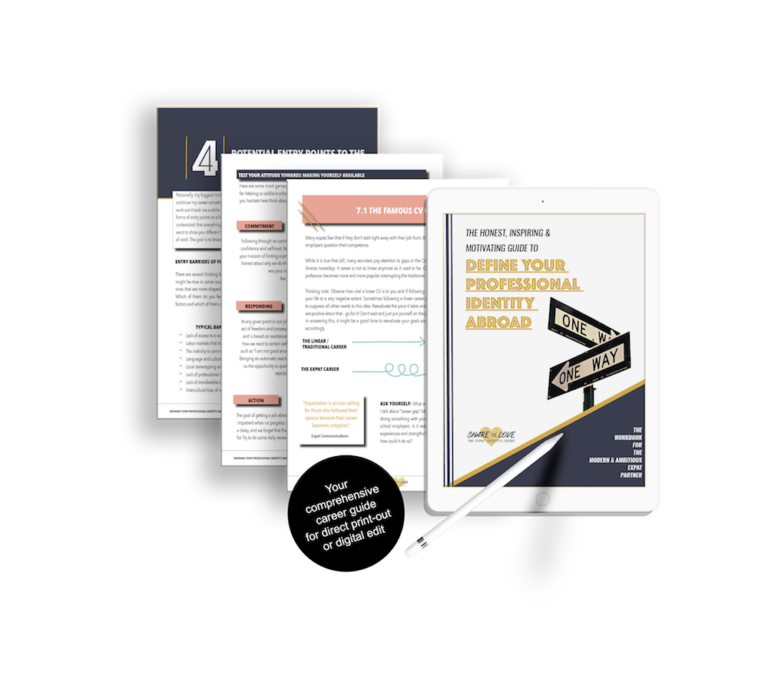HOW TO OVERCOME THE CULTURAL BARRIER WHEN APPLYING ABROAD?
Differences between the Expat and the Expat Partner
HERE ARE MY TOP 3 TIPS REGARDING CULTURAL BARRIERS AT THE WORKPLACE. YOU WILL FIND MORE INFORMATION IN MY COMPREHENSIVE EXPAT PARTNER CAREER GUIDE WHICH YOU WILL FIND HERE:
Want some good vibes in your mail?
TIP 1: MAKE YOURSELF VISIBLE
No matter where you are going you will most likely do not know many people and hardly anyone will know you. Try to make yourself as much visible as possible by signing up to as many job portals and networking events as possible. Put yourself out there and try a different version of presenting yourself and your skills to get a feeling how your own culture differs from your host culture and how to adopt.
TIP 2: MAKE THE MOST OUT OF YOUR INTERNATIONALITY
The fact that you are coming from a specific country adds a new skill to your CV. You are fluent in that language and have a deep understanding of the culture and communication tactics as it’s your home country. Some Expat Partners don’t stress where they are coming from, but there is a particular strength in owning it and put it as a skill on your CV.
TIP 3: GET A FEELING FOR THE FOREIGN JOB MARKET
Nothing is as devastating as applying for hours and hours just to not hear back at all. Gather some information on the internet about the labor market situation and some industry insights. Most of all, try to speak with people that are actually working in the area you want to apply for and learn how they did it. In some cultures, networking is more important than others. Also, have a piece of knowledge about how hard it is for locals to land a job will give you some peace of mind to start with!
Overcoming the cultural barrier is a HUGE topic, and there are many different approaches to tackle it. If you want to find out more about this, check out my career guide for Expat Partners to prepare yourself for that great adventure of living and working abroad.
Thanks for sharing the love and stopping by

Share this article with a friend and share the love:
You also might like:

Why career coaching is so essential in times of new work
As a coach, I have seen a visible increase in the need to explore different career options. While some clients are finally planning to tackle going back to work after a long break, other clients are seeking a shift in their current career feeling their skills and values are not matched with their current profession. During the pandemic the buzzword „The great resignation“ came up, illustrating the global need for creating a new work-life balance. In this article, I will highlight some interesting global facts around the topic of the great resignation and explore why coaching is such an essential tool for employees (and potential employees) to gain realignment with their careers.

A Different Approach to Everyday Life: A Return to One’s Own Values Abroad
Living abroad not only opens up a completely new view of the country and its people. The perception of worldwide cultural differences also does something to one’s own ideas. What is desirable? What belongs to the things that are absolutely necessary and what are things that are considered absolutely necessary in one culture and play no role at all elsewhere? This becomes very vivid if you make yourself aware of an everyday situation in a very concrete way. In this article, I look at the different designs of children’s rooms around the world and what this has to do with a return to our basic instincts.

Alltag anders: Die Rückbesinnung auf eigene Werte im Ausland
Das Leben im Ausland eröffnen einem nicht nur eine vollkommen neue Sicht auf Land und Leute. Die Wahrnehmung von weltweiten Kulturunterschieden macht auch etwas mit den eigenen Vorstellungen. Was ist erstrebenswert? Was gehört zu den Dingen die man unbedingt braucht und was sind Dinge die in einem Kulturkreis als unbedingt notwendig angesehen werden und woanders überhaupt keine Rolle spielen? Ganz plastisch wird das wenn man sich einmal ganz konkret an einer Alltagssituation bewusst macht. In diesem Artikel widme ich mich der unterschiedlichen Ausgestaltung von Kinderzimmern weltweit und was das mit dem Zurückbesinnen auf unseren Urinstinkt zu tun hat.

Why less families decide to move abroad
Are families less willed to move abroad in this world of uncertainty? How will expat assignments change within the next year? How to make the decision of moving abroad or working from home in another country? This article is shedding some light on the future of global mobility in the world we are living in right now.

The effect of giving yourself an A
What happens when you pretend the best case scenario already happened? Sharing a fun and compelling coaching exercise called „giving yourself an A“

The 4 types of Female Expats
How differently do women approach the concept of a career abroad? What traits can be assigned to the various international CVs? I spoke with 30 female breadwinners who have made it abroad and identified 4 types that have emerged time and again. In this article, I discuss each type and show what you can learn from them.




3 Antworten
Hi Kate!
Very useful post, as always!
May I ask where did you find the statistics about that 20% jobless expat partners?
I also write on a blog (in spanish) about living abroad and I was searching that kind of data. Unfortunately I couldn’t find it. It would be very interesting if you could provide me some source.
Thank you and schöne Grüße! 😉
Absolutely! I just sent you an email with some sources. Hope that helps. <3 Greetings from Chicago
Wow Kate! Your mail was really useful!! Thank you very much!! 😊